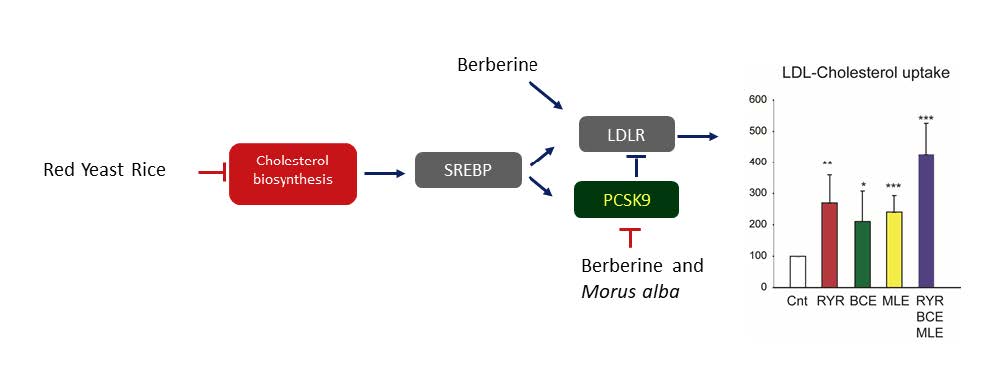Proprotein convertase subtilisin/kexin type 9 (PCSK9) is the key regulator of low-density lipoprotein cholesterol (LDL-C) plasma levels. We previously observed that treatment of dyslipidemic subjects with nutraceutical combination containing red yeast rice (monacolin K 3.3 mg), Berberis aristata cortex extract (Berberine 531.25 mg) and Morus alba leaves extract (1-deoxynojirimycin 4 mg) (LopiGLIK®) did not alter the plasma PCSK9 levels. Thus, the aim of the present study was to investigate the effect of these three components on PCSK9 expression in HepG2 cell line in relationship to their effects on LDL-C cellular uptake. HepG2 cell line were incubated with Berberis aristata cortex extract (BCE), red yeast rice (RYR) and Morus alba leaves extract (MLE) alone or in combination for 24 h. RYR (50 µg/mL) increased PCSK9 protein expression (WB and ELISA assays), PCSK9 mRNA and its promoter activity. BCE (40 µg/mL) reduced PCSK9 expression, mRNA levels and promoter activity. MLE determined a concentration-dependent inhibition of PCSK9 at mRNA and protein levels, with a maximal reduction at 1 mg/mL; no significant changes in PCSK9 promoter activity were found. MLE also downregulates the expression of fatty acid synthase and HMG-CoA reductase mRNA levels. The combination of RYR, BCE and MLE reduced PCSK9 at mRNA, protein, and promoter activity. Finally, this combination induced the LDL receptor and LDL-C uptake by HepG2 cells. In conclusion, the positive effect of MLE on PCSK9 supports the rational of using this nutraceutical combination to control hyperlipidemic conditions.

